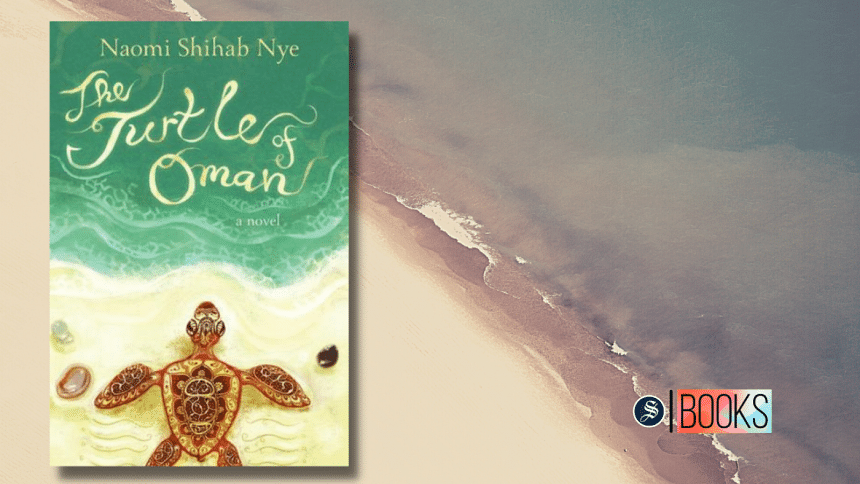Discovering something not-so new with ‘The Turtle of Oman’

Back in sixth grade, I remember the dread I felt when I first heard my parents were shifting houses from Uttara (aka the "country-side") to the more posh region of Dhaka city. I had been living there for 16 years since birth and now we had to leave because the grown-ups had to ease their route of commuting. I remember not throwing a tantrum, not resisting our departure by any means, but getting completely paralysed with dread and scepticism of what's awaiting me. The melancholic, tuned nostalgia of finishing a journey was being caressed by the soft yet upbeat rhythm of the journey coming forth. Eight-year-old Aref reminded me of those times again in Naomi Shihab Nye's book The Turtle of Oman. Though his story is told in a much broader chain of events, I could still resonate to the emotions felt within them.
"We slept on the roof all summer long when I was a boy and the Milky Way poured its stories down on our heads and into our dreams…" is a quote that describes the feeling I felt while reading The Turtle of Oman. In the book, the protagonist is Aref, who lives in Muscat, Oman, but will soon move to the US with his PhD pursuant parents who will stay there for the next three years. He and his mother are preparing for their flight which is due in a few days while his dad prepares their new home about 7,000 miles away at Ann Arbor, Michigan. Needless to say, Aref is not at all elated about packing his things up in his new green suitcase; neither is he pumped about his new life on the other side of the world. The impending departure brings about a range of emotions for Aref, including fear, resistance, and a sense of loss.
Throughout the book, there are short chapters that vividly paint the scenic beauty of Muscat seen through the eyes of this kid. It shows the colourful landscape like the lively palm trees standing high and tall and the sea shore whose sand is being stepped on by small turtles that occupy most of Muscat's beaches. The more their departure date draws closer, Aref dawdles around packing his bag, making his mother constantly worry about their timely arrangements. Personally, I know I would never start packing my bag until the night before a two-weeks-long trip, so, if my calculations serve me right, Aref's mother is just being a mother and worrying about it too much.
But the parts of the story that engrossed me were the small adventures Aref had with Siddi, his grandfather. Siddi is a wise, old man with a heart full of nothing but love and warmth for his grandson. He takes Aref on short walks to the local bazaar, the beach and the Royal Oman Symphony Orchestra. As someone who still relies on books for the cultural descriptions of a place in this age of instant google searching, this book was a great treat for me as I got to learn about the wide range of birds seen at the outskirts of Muscat and the fun little details we get to see—like how Little Ringed plovers act out a "broken wing" near its nest to lure away predators from its eggs—thanks to Siddi. Siddi also takes Aref on a longer trip to the Night of a Thousand Stars camp, where they spend the night with a diverse group of strangers, all coming together for the mutual love of stars and just a peaceful desert breeze. There's an eloquent description of the bedouins or gipsies of the deserts and their lifestyle that we also see as Siddi and Aref spend their time with Naveed, their cheery Indian companion at the camp.
The small journeys inside Muscat and Aref's time with Siddi makes him realise that no matter how far life takes him, these people and these scents of spices and desert sand will not get lost, rather, will swirl around in his heart forever as he has internalised these things that makes him feel at home; and home is where one's heart is! By the end of the book, Siddi and Aref sit in Aref's backyard and reflect back to the seagulls, the Nut-Man, the unhatched turtle eggs by the beach, and love. They spend their final hours together looking back at the new things and the not-so-new things they discovered and rediscovered during their time together.
The life we spend is not something we secure from the unknowns in a tight, homely hug. Maybe I left the place I grew up in, but that doesn't mean a part of my life was deducted but more like a book with new, empty pages waiting for new stories to be written. I might even leave the place I am currently staying in for a greater new. But if there's one thing I know, I have my belongings filtered in my heart, things that will forever stay and be my home—just like how Aref finally packs his bag with his belongings and proudly announces it to his mother.
Anika Zaman is a 12th grader studying at Birshreshtha Noor Mohammad Public College. She loves cats and Kit-Kats and shall become Willy Wonka the day something goes wrong with Kit-Kat.


 For all latest news, follow The Daily Star's Google News channel.
For all latest news, follow The Daily Star's Google News channel. 










Comments